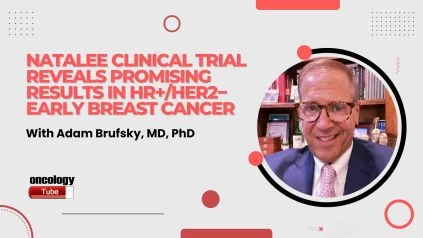Adam Brufsky, MD, PhD from the University of Pittsburgh discussed the higher risk of recurrence in certain breast cancer patients and the need for additional therapies beyond hormonal therapy and chemotherapy.
He highlighted that hormone receptor-positive (HR-positive), HER2-negative breast cancer represents about 60-70% of all breast cancer cases, and approximately 20% of all breast cancer patients would be considered for additional therapies.
The NATALEE trial evaluated the addition of Ribociclib, a CDK4/6 inhibitor, to hormonal therapy for adjuvant treatment in patients with HR-positive, HER2-negative early-stage breast cancer.
The study included patients with stage 2 and stage 3 breast cancer who received standard therapy and were randomized to receive an aromatase inhibitor with or without Ribociclib.
The primary endpoint of the trial was invasive disease-free survival (iDFS), with secondary endpoints including overall survival, quality of life, and side effects.
The trial demonstrated a significant benefit in terms of iDFS and distant disease-free survival with the addition of Ribociclib.
In the overall trial population, there was a 3.3% absolute benefit in iDFS and a relative risk reduction of about 26% in the risk of invasive disease. Patients in the Ribociclib arm also showed a 2.2% absolute difference in distant disease-free survival.
The benefit was particularly significant in stage 3 breast cancer patients, while the statistical significance was not observed in high-risk stage 2 and lymph node-negative patients.
The most common adverse effects observed with Ribociclib in combination with hormonal therapy were neutropenia and liver function test abnormalities.
However, the incidence of neutropenia appeared to be reduced compared to higher doses used in metastatic trials. Overall, the side effect profile was tolerable, with low incidences of QT prolongation and grade 3 QT prolongation.
Dr. Brufsky emphasized the need for longer follow-up to assess the stability of the trial results and gather more data on long-term safety.
Additionally, he discussed the potential of exploring Ribociclib in combination with other therapies, such as Everolimus, in different stages of breast cancer, including metastatic and triple-positive breast cancer.
In conclusion, the NATALEE trial demonstrated a clear benefit of adding Ribociclib to hormonal therapy in reducing the risk of recurrence, particularly in stage 3 breast cancer patients.
The study opens up the possibility of treating earlier stage breast cancer patients who were traditionally not treated with additional therapies. However, further analysis and longer follow-up are necessary to confirm the stability of the results and evaluate the long-term outcomes and impact on quality of life.

